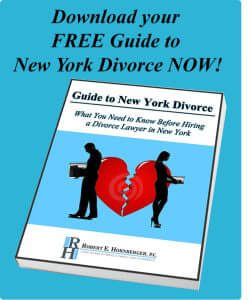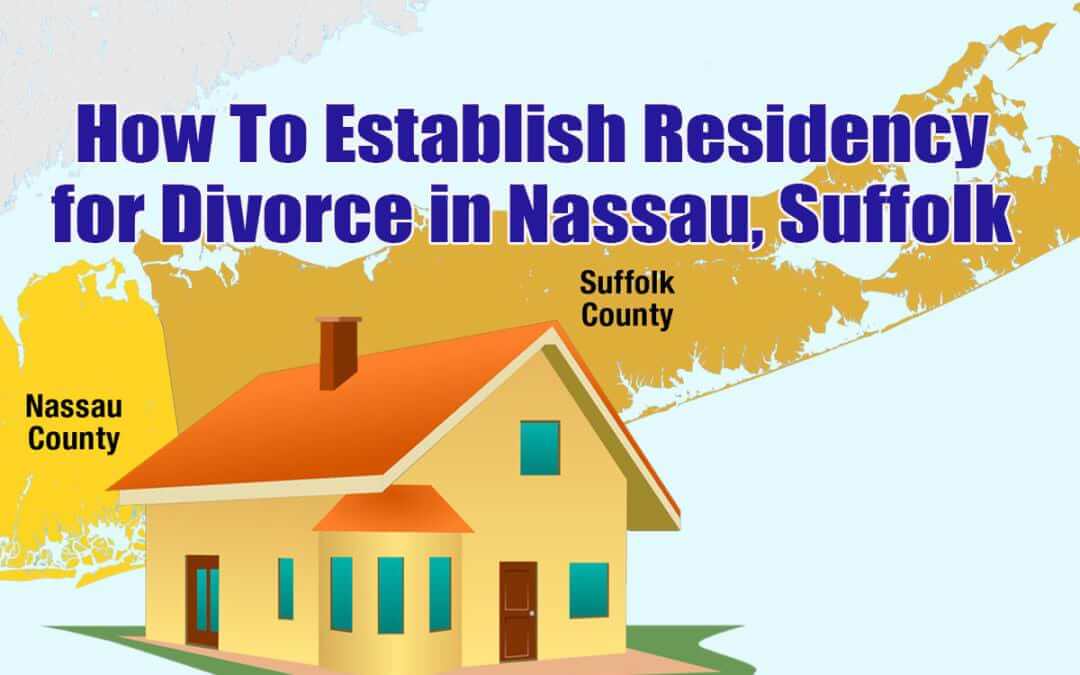Bringing a Divorce Action in New York – Requirements for Residency
Many couples contemplating or facing divorce no longer live together. In many instances, spouses may live in two different states. Each state has specific requirements for length of residency before an individual can file for divorce in that state. Although New York now has “no-fault” divorce, which requires a breakdown in the marriage for a period of six months, the residency requirement must first be satisfied before a couple can get a divorce on Long Island.
What Constitutes Residency in Nassau County or Suffolk County?
Nassau County or Suffolk County Supreme Courts will hear a matrimonial proceeding so long as the parties have a sufficient connection to the State. Parties commonly establish a sufficient connection to the State by showing that they are residents. The “residency requirement” applies to proceedings for divorce, annulment, or judicial separation. Whether a person is a physical resident depends upon whether he has lived in the state for some length of time during the course of a year, resulting in a significant connection to the state.
Under New York law, residency can be established in one of five ways:
-
the marriage ceremony took place in New York and one or both parties have lived in New York for at least one year prior to filing.
-
the parties resided together in New York as husband and wife, and one or both parties have lived in New York for at least one year prior to filing.
-
the cause of action took place in New York, and one of the parties has lived in New York for at least one year prior to filing.
-
the cause of action took place in New York, and both parties live in New York at the time of filing.
-
either party has lived in New York for two or more years immediately prior to filing.
One of these requirements must be satisfied in order for the divorce proceeding to be heard in New York. Residing continuously in the state for the stated period of time does not mean that the party cannot have left the state at any point during that time, and does not mean that the party cannot also maintain a place of residence in another state. However, as stated above, physical residence may be demonstrated by a place of residence and physical presence in the state, and a significant connection to the state. The residency requirement is intended to prevent out-of-state parties from choosing New York as a forum because the laws may be more favorable to them here.
Suffolk County or Nassau County Supreme Court Handles All Divorce-Related Matters: Child Custody, Visitation, Child Support, Spousal Support, Etc.
The Suffolk County or Nassau County court that handles the divorce proceeding will also have jurisdiction over issues related to divorce, such as child custody, visitation, child support, and spousal support. It will also be the court in which any amendments or modifications are made. Therefore, it is important that divorce actions are commenced in the home state of the plaintiff so that parties will not have the stress and expense of traveling out-of-state for each hearing or conference.
File for Divorce on Long Island to Avoid Commuting Out of State
For this reason, if your spouse lives in another state, but you live in New York, it might be wise for you to file in New York before your spouse files in his or her state. As long as your spouse can prove residency in the state or country to which he or she moved, he or she can likely file for divorce there. If a divorce proceeding is commenced in another state, you may be required to participate in the proceeding there. However, related issues such as child custody and visitation may be addressed separately, depending upon where the children reside.
Long Island Divorce Lawyer Helps Suffolk County Nassau County Residents
If you have questions about whether your Long Island divorce case meets the residency requirement for divorce in Suffolk County or Nassau County, NY, contact the compassionate and experienced Long Island divorce lawyers at the Office of Hornberger Verbitsky, P.C. at 631-923-1910for a free confidential consultation.
For more information about Divorce on Long Island, visit this page: Divorce Lawyers Answer Questions about Long Island Divorce
Download our Free New York Divorce Guide
Our 41-page “Guide to New York Divorce: What You Need to Know Before Hiring a Divorce Lawyer in New York” written by an experienced family law lawyer Long Island’s Robert E. Hornberger, Esq., provides you with real information on the divorce process and the laws it rests upon in the state of New York. This book will help give you a solid foundation upon which you can begin the process of making your family’s, life better. Download your Free Guide to New York Divorce here.
 Get Answers to Your Divorce Questions:
Get Answers to Your Divorce Questions:
- How to Know if It’s Time for a Divorce?
- Divorce or Legal Separation? Which is Right for Me?
- What are the Grounds for Divorce in New York State?
- How to Find the Right Divorce Lawyer
- What Are Your Child Custody Options?
- The Ins & Outs of Child Support on Long Island
- Do I Have to Pay Spousal Maintenance (Alimony)?
- How Does ‘Equitable Distribution’ Effect My Divorce (Marital Property)?
- What Other Options Do I Have to End My Marriage (Divorce Mediation, Collaborative Divorce)?
- How Do I Move On & Enjoy a Healthy Life After My Long Island Divorce?













